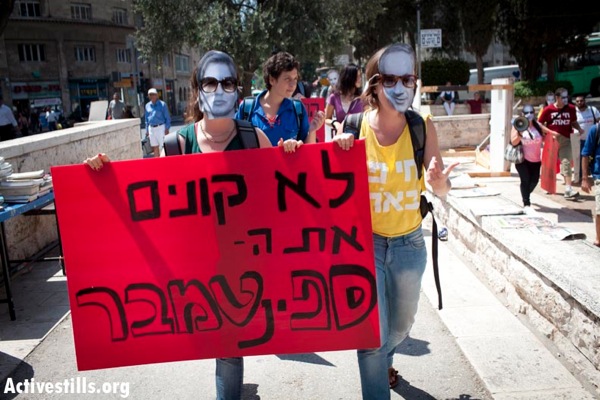Wednesday night a first meeting of its kind was held by activists who have decided to facilitate an encounter of the ‘tent struggle’ movement and ‘Palestinian September.’ The path we have taken might lead to a mass movement of refusal that prefers occupation wars to peace and struggle for social justice. Here is a summary and some conclusions of this meeting.
After stormy weeks filled with encounters, discussions, workshops, discourse and exchange of ideas and opinions in all the protest encampments throughout the country, with Tel Aviv’s Rothschild Boulevard encampment leading the way, this particular discussion was held at a safe distance. Wednesday night at 9 p.m., mats were spread out on the northern part of Chen Boulevard (a safe 10-minute walk from the end of Rothschild), a loudspeaker was set up and a cordless microphone began to make the rounds. The purpose of this discreet public meeting was to discuss the ramifications of September upon the historic socio-economic struggle..
About 80 people showed up. Most of them were young tent dwellers, some of them more experienced older adults. A few of them were veterans of leftist activism (political left – after all nearly everyone right now has taken up the economic left ideas), some of them latent leftists, others who have only recently begun to give the subject some thought following conversations in the encampments, and this was their first time at an encounter of this kind. The vast majority present was unfamiliar to me, and that alone is already positive.
It quickly became clear that the consensus in the group is non-opposition to the Palestinian move in September, and non-confidence in the government, which will likely prefer to resort to crisis and war rather than make peace. Another area of consensus was a set of priorities that places the pursuit of the socio-economic struggle above “security needs” and even strives to expand the discourse of the struggle so as to demand social justice on both sides of the ‘Green Line’. Upon these common notions and interests, we agreed to continue meeting in the future – inside the Rothschild encampment (and then also in Jaffa, Haifa, Beer Sheva-Bir Sab’a, Lod-Lydd), as well as plan joint actions in the coming months.
Naturally, controversies appeared alongside our consensus. Some said we were living de-facto in a single state under a single regime, this must be recognized and we should adapt our solutions accordingly. Others continued to speak in terms of two states. There were those who supported hasbara activity amidst the Jewish public, promoting the idea that Occupation harms us. Some supported the line of partnership with the Palestinians and the joint message protesting injustices of Occupation. There were arguments around the question whether to try and promote talk about September through the encampments’ leadership or on the street. Ideas for action, too, were many and colorful, with various emphases, and some decision will have to be taken eventually as to which of them are to be used. But everyone wanted this to continue.
During the meeting, several people expressed strong reservations about the possibility of recruiting all of civil society for a refusal project. They spoke of “the people” and “the left” as if these were two disconnected bodies that would never be able to cooperate. Up until a month ago, I would have said that, while I disagreed with this point of view, I understood where it came from – that the extreme-right government’s policies and sustained assault on the left made them feel as though there was no common ground. Now, however, I can state unequivocally that the perception of an unbridgeable rift between “the people” and “the left” has been completely disproved.
Translated by: Tal Haran


